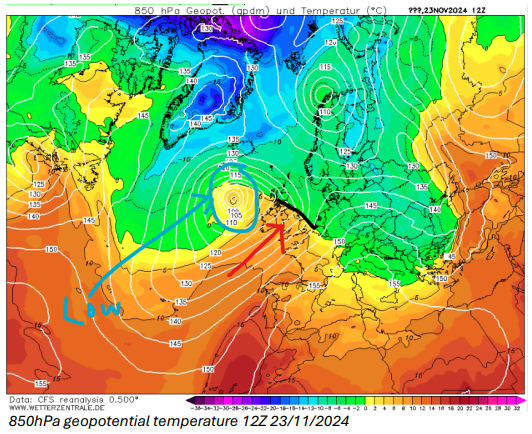
November saw a major drop in temperature, with the heavy snowfall and extreme cold temperatures marking a significant event.
Over Friday night into Saturday morning, cold air blew into the North West of England from the Arctic, and as the wind blew south, a low pressure system came in from the west, bringing prolonged snowfall to the North-West.
Temperatures around the country fell to extreme lows at points, with many areas such as Manchester and Salford seeing temperatures of around -1°C to -6°C.
In turn, the lower temperatures meant the fallen snow did not thaw out, allowing it to lay and for more snow to stick for days.
However, this was then offset by the arrival of Storm Bert on Saturday, which bring warmer winds with it, with the temperature rising to 15°C.
The rise in temperature then caused the snow to thaw, leading to heavy rainfall in areas across the North-West.
The aftereffects of this sudden shift in temperature could be seen in Greater Manchester, as the River Irwell in Ramsbottom, near Bury, burst its banks on Sunday, causing floods in the surrounding area.
Though early snowfall and cold temperatures are not uncommon for November, the extent of the snowfall combined with the extreme cold temperatures do mark a notable occasion.
Due to climate change, winters are becoming warmer and wetter, with rising global temperatures lessening the commonality of events like this, as snow is likely to thaw before it has the chance to stick.
According to NetWeather, future snow events like this are more likely to be reduced to smaller local areas.
“With the warming climate, such snow events are tending to become more localised and more restricted to high ground with time, but as last week showed, widespread snow cover to low levels is still possible around or shortly before 20 November.”
This means that snow events like this will be less widespread in the future, more likely to affect people in small local areas rather than generally throughout the UK, in particular affecting people who live in areas on higher ground.
A snow event like this hasn’t been seen in November in the UK since 2010, though on that occasion the snowfall did not bein until 25th November.
In summary, the cold spell we just experienced was significant due to the extent of
lying snow and extreme temperatures observed in November – and is becoming
increasingly uncommon/rare with a warming climate. Events like this will still occur
in the future, however may become increasingly uncommon. However, spells like
this are expected in Novembers climate and is no cause for concern over climate
change.
